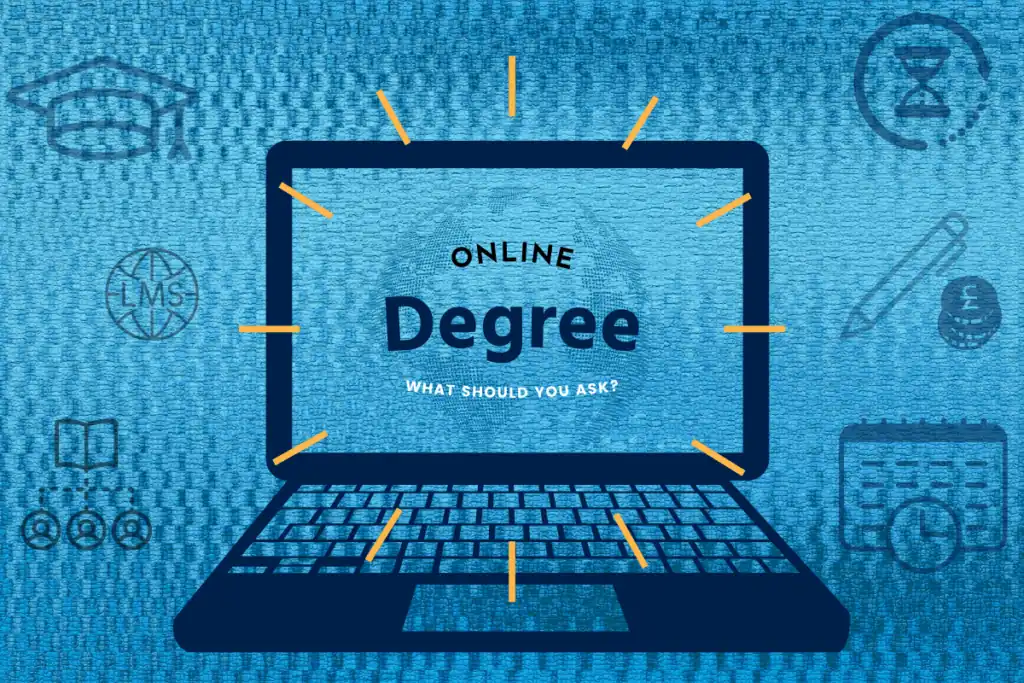With the vast number of online degrees available, choosing the right one can be a confusing process. Here are some key things that prospective students should consider to help them make the right choice.

Online Vs Campus Degree
Online degrees are no longer inferior to their on-campus counterparts. Therefore, there is no reason to feel that only “real” degrees come from traditional classroom courses.
On-campus degrees are a right of passage for many and if you have the time, taking three years out to live and study full time is a great life experience. However, if that is not possible for you, then part-time, flexible study is the answer.
The reality is that an online degree programme will offer precisely the same benefits as an on-campus course, including the potential for group work, networking and career prospects.
With an online degree, you can study anywhere in the world, making flexible learning an excellent opportunity to gain a university-level qualification without the opportunity cost of stopping work.
Think About Your Goals And Timeframes
Online learning is great because it gives students maximum flexibility to study at their own pace.
Many students sign up for distance learning courses to complete their studies as quickly as possible to gain a qualification.
There are online degree programmes you can finish in one year of full-time study. However, most online courses are part-time, meaning that a full degree can take between 3 and 8 years to complete.
If you are taking a course to boost your income, make sure your industry recognises the course. Do your research to make sure you know what type of courses will have the impact you are looking for on your career.
Work Out How Much Time You Can Commit To The Course
Before you sign up for your ideal course, you need to make sure you have the time to dedicate to study. An online degree requires dedicated hours of regular commitment, so ensure that you have the motivation and discipline.
Just because it is flexible learning does not mean it will be easy. A lot of studying and research goes into getting a degree and earning a quality education.
So be realistic and honest with yourself about how many hours a week you will set aside for the course.
Make Sure You Have A Plan To Fund Your Study

Online degrees tend to have lower fees than on-campus equivalents, but the costs are still significant for many. Be realistic about how you will pay for fees, course materials, and living costs, as this is one of the main reasons students drop out.
We have a guide on financial aid for UK residents here that has links to information on scholarships that anyone can apply for no matter where they are based. If you are planning on asking your employer to help finance your studies, this guide will help.
Understand The Entry Requirement
Each university sets its own entry requirements. To join a degree, you would generally need A-levels or equivalent certification.
However, if you have a non-traditional academic background taking an Access to Higher Education (HE) Diploma is an option. You can find out more here.
For mature students who already hold specific qualifications, a Top-up degree might be an option. These courses, in effect, enable entry into the final year of a degree and significantly reduce the amount of time required to gain a full undergraduate degree. This article has more in-depth information.
Accredited Online Degree Providers

Make sure that the online degree programme you join is an internationally recognised qualification. Luckily, fake universities and degree mills are very rare in the UK. But, if in any doubt, check and don’t be afraid to ask the university for confirmation.
The UK government handles the accreditation of universities. This article is a complete guide and lists all the accredited degree-awarding education providers in the UK.
University Ranking And Reputation- Online Courses
University league tables and rankings can be a good starting point to narrow down your search. It is worth checking their reputation as this can also give you some insight into the standard of teaching and what potential employers may think about the degree.
Each university will have its own strengths and weaknesses. The guardian has an easy-to-use league table that you can use to search by subject area and institution.
Assessments And Learning Outcomes- Online Education
Each online degree will differ, and no two courses are the same. When choosing an online degree, ask for a programme specification once you have narrowed down your choice. The programme description will list the learning outcomes and assessment methods.
Make sure you understand how your tutors will assess you. Most courses have a mixture of essays, coursework and exams. However, more and more online programmes are 100% coursework based, so you do not even need to travel for exams.
If the course has exams, you will need to travel to the exam centres on specified dates. Many universities have agreements with the British Council for international students to sit the tests in their home country.
Online Learning Experience

The learning experience when studying online is no longer a solitary struggle. The days of “distance learning” are long gone. Nowadays, many online degrees incorporate collaborative projects as part of the assessment process.
Online programmes usually use a Learning Management System (LMS) to manage all aspects of the course and communication. From running virtual labs to submitting assessments. LMS’s are the backbone of online learning.
Modern online degrees consist of on-demand lectures, asynchronous and synchronous discussion and live one-to-one sessions with a tutor. With so many ways to connect, online distance learners often have more access to tutors than on traditional on-campus courses.
When inquiring about a course, ask if they have any demos or examples of their LMS environment. Seeing a live view of the LMS can be a great way to get a feel for the programme.
Student Support And Services
Online learning brings many benefits over traditional on-campus education. The student experience is now far more interactive than before. However, you still need to consider the support and services available when studying with online teaching and learning.
Student support is a broad area but getting non-academic help when you need it can make a real difference.
When speaking with prospective course providers, ask about the following.
- Online library access and assistance
- Student union membership and benefits
- Student services contact options
- Dedicated non-academic contact person
Also, if you require any extra assistance for medical or accessibility reasons, make sure you find out what support is offered when you apply.
Employability And Student Progression

With an increasing focus on employability skills, university degrees are becoming far more career-orientated. As a result, most universities will offer advice and support with work experience opportunities, job plans (including internships), CV’s etc.
It is worth asking what careers support they offer and examples of what previous graduates have achieved.
Established Programmes Vs New Online Courses
There are many tried and tested online degree programmes that have been around for years. These courses will usually offer students a proven learning experience. The structure and pace of the online course will have been developed and refined over the years.
However, there are now a lot of universities offering newer online degree programmes- each year, new courses are being developed and launched. So, while you won’t benefit from the years of experience from more established courses, you will be studying the most up to date syllabus. The course will be designed around the latest communication tools and learning design.
Choosing an online degree is not as daunting as it was a few years ago. There are hundreds of courses available across a wide range of disciplines, and you will benefit in different ways from taking an established or brand new course.
Flexibility To Study, Work And Manage Family Life
With many online courses, you can fit your degree around your life rather than the other way round. However, managing your responsibilities outside study time is essential to get the most out of an online course.
Having said that, it is also essential to fully understand your options when life events come up. For example, many courses and universities offer a pause button on your study. Ask about this when you are applying so that if you need to use it, you are fully aware of its impact.
Each university will have different regulations, and the flexibility can vary greatly. For example, you may find that if you pause your study, you may need to wait for an entire year before rejoining the course where you left off.
Online University Search
Whether you’ve been considering an online degree, master’s or short course, we hope this guide has given you some insights into the many things to consider.
Take time to research the institution and courses offered. Find out if it will fit your needs or not before signing up for anything! You can search online courses here by level and subject area.

